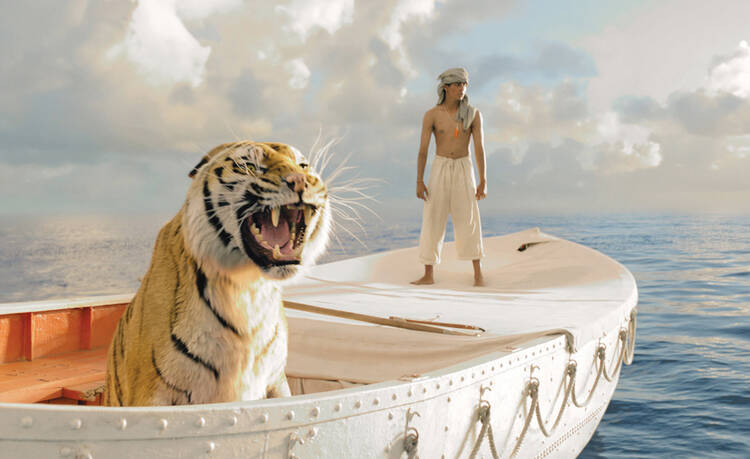Put on a pair of 3-D glasses and treat yourself to the sensuous Life of Pi, a film that offers viewers a succession of unforgettable screen images, beginning with a parade of exotic animals seemingly filmed in Eden. Other scenes depict terrifying thunderstorms at sea; starlit night skies of cosmic grandeur; glowing, undulating creatures, inhabitants of a mysterious underwater world; a whale leaping in an exuberant arc out of the ocean depths; and sunlight bouncing off the mirrored surface of an ocean becalmed.
Ang Lee has taken Yann Martel’s acclaimed philosophical/psychological novel about a zookeeper’s son who survives a shipwreck alone on a lifeboat with a Bengal tiger, and has animated it through ingenious effects, including a digitally enhanced tiger. But Lee (director of “Brokeback Mountain”) has done much more than assemble astonishing images. Namely, he has carefully preserved the underlying tensions and thought-lines that make this story provocative, relevant and even important in our day.
For despite its trappings as an adventure story or a coming-of-age journey, Yann Martel’s 2001 novel, which won Britain’s Man Booker Prize for fiction, lays out the religious side of the ongoing argument between science and religion, atheism versus belief. Rather than arguing his points, however, head-to-head in a classroom or through dialogue, as in the film “My Dinner With Andre,” Martel creates an appealing character who embodies faith, a young Hindu-Catholic with an interest in Islam and Judaism, too.
Piscine Molitor Patel is a modern Job figure. Don’t be thrown off by his name—from a swimming pool in Paris—one of many bits of humor in this serious, powerful story. You have to be introduced to faith, Piscine says, ever wiser than his years.
Lee’s film introduces us to faith through a screen hero so atypical as to be a kind of anti-hero. Pi, a self-made nickname pronounced like the mathematical constant 3.1416, shows how a believer responds to life, including its immense suffering. Though he loses his beloved parents and brother in the shipwreck, endures months without human companionship, undergoes injury, starvation and thirst, he survives without losing his faith. Indeed, Pi’s habit of gratitude to God—for his own life and for that of this marvelous universe—never wavers.
Suraj Sharma, in the title role, gives the teenage Pi a natural winsomeness, both innocent and knowing, that sustains our attention. Unlike a typical adventure hero, this 16-year-old does not fight the tiger and emerge the victor. Instead, he is a vegetarian animal lover, a studious reader and to his marrow a man of peace who says he is sorry when he kills his first fish. When the young Pi tells his father he believes animals have souls, his father urges him to rely on reason. On the lifeboat Pi heeds his father’s advice, using reason to train the tiger and subdue it, so that the two of them can survive. But survival is not his only concern. Pi fishes relentlessly in order to feed the tiger, when he might have killed it or at least let it drown and saved himself the effort. Once, when the tiger (whose name, for another laugh, is Richard Parker) plunges into the ocean and cannot get back into the boat, Pi thinks it over and makes him a ladder. Finally, in one pietà-like image, when Pi thinks they are both dying, he places the tiger’s head on his lap and strokes it. Few superheroes would claim, as Pi does, that Richard Parker actually saved his life.
We are helped to suspend our disbelief by the opening scenes. Pi is not just any boy, but a Hindu who has grown up with animals, the very animals his zoo-owning father has had packed onto the freighter on which he and his family are sailing across the Pacific to seek a new life in Canada. Pi has spent years getting to know Richard Parker and Orange Juice, the female orangutan who takes shelter on the lifeboat, along with one of the zoo’s zebras and a hyena, in the early lifeboat scenes.
Pi is also intelligent and resourceful, the kind of person who would scour the boat for supplies, read and reread the survival manual, be disciplined about eating the rations and purifying drinking water. He is a problem-solver, a boy able to build himself a life raft out of life jackets and boards, and he is an accomplished swimmer. Pi has shown internal fortitude, too, in seeking Christian baptism, for example, despite the contrary views of his uncle and father.
Few films based on novels can maintain the complexity of the printed word, but they may not need to. Directors can edit to help propel the story forward, which is what Lee has done. The story’s quickened pace and simplification—the removal of encyclopedic passages about animal behavior and the slow motion violence of the hyena’s attacks and demise, for instance—make the religious questions stand out more clearly. Lee has kept the novel’s framing conceit, so that in the opening and closing scenes viewers look on as the adult Pi tells his story to a writer. Especially in the final scenes, this device, which seems to let Pi step right out of the story, works. By this time we have heard two different stories. The second one sounds like a newspaper account about the survivors of a shipwreck, darkened by human brutality and their reaction to it. That story has few surprises and no animals, but could be true to the facts.
Just as Pi asks the writer to whom he has entrusted his tales, Lee asks us to choose which story we prefer. We are invited to step into the story ourselves. We have seen Pi’s example and we know, as moderns, the arguments for science and provable fact. Therefore we should be ready at least to consider the proposition put before us: Do we choose science or religion, atheism or faith?








